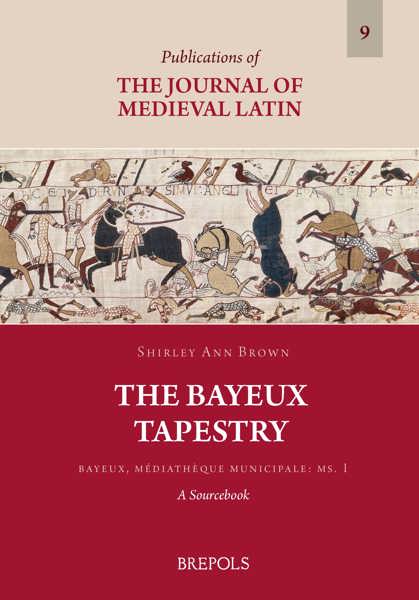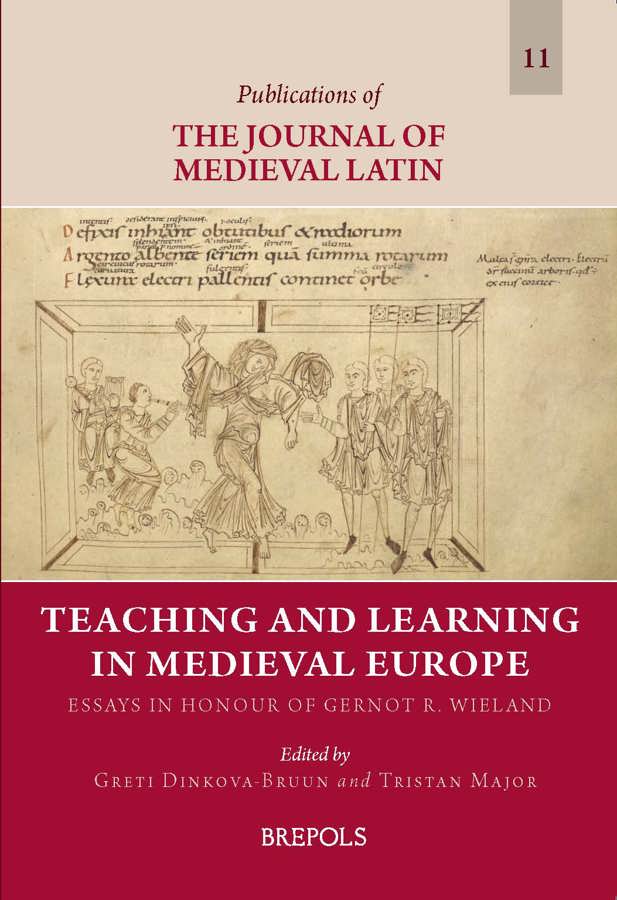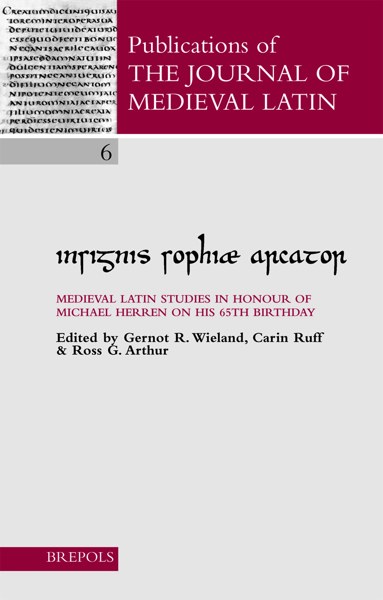
Teaching and Learning in Medieval Europe
Essays in Honour of Gernot R. Wieland
Greti Dinkova-Bruun, Tristan Major (eds)
- Pages: 249 p.
- Size:178 x 254 mm
- Illustrations:4 b/w
- Language(s):English, Latin, Old English
- Publication Year:2017
- € 100,00 EXCL. VAT RETAIL PRICE
- ISBN: 978-2-503-56843-0
- Paperback
- Available
- € 100,00 EXCL. VAT RETAIL PRICE
- ISBN: 978-2-503-56844-7
- E-book
- Available
The essays collected here honour the life-long contribution of Gernot Wieland in the fields of Anglo-Latin and Old English literatures.
“All in all, this is a timely volume that is of interest to a wide range of scholars.” (Sarah B. Lynch in Cerae, 4, 2017)
“Overall, Teaching and Learning in Medieval Europe offers many compelling new readings especially for specialists in manuscript studies of England, with several additional essays supplying tangents into other European traditions. As an homage to Wieland's career, the collection successfully conveys the extent of his scholastic legacy.” (Amanda Gerber, in The Medieval Review, 20.11.2018)
« Il ne fait aucun doute que ce volume constitue un riche et bel hommage à la contribution si importante que G. Wieland a apportée à l’étude des gloses, de l’enseignement et de la littérature dans le Moyen Âge latin. » (Jean Meyers, dans Le Moyen Âge, 126/2, 2020, p. 352)
Greti Dinkova-Bruun is a Fellow at the Pontifical Institute of Mediaeval Studies, Toronto. In 1999, she obtained her PhD at the Centre for Medieval Studies in Toronto and in 2001 received her LMS at PIMS. In addition to articles in many academic journals, she is the author of various critical editions and translations of medieval texts. In 2013, she published as a co-author a book on Robert Grossesteste’s colour theory, The Dimensions of Colour. She is the Editor in Chief for volume 10 of the Catalogus Translationum et Commentariorum (2014).
Tristan Major is an Assistant Professor of English Literature at Qatar University. In 2010 he obtained his PhD at the Centre for Medieval Studies at the University of Toronto and in 2011 was a Postdoctoral Fellow at the University of British Columbia. He has published on Anglo-Latin and Old English literature, specifically on biblical reception. His current research focuses on the letters of Ælfric of Eynsham and Anglo-Saxon hagiography.
Over the span of his career, Gernot R. Wieland has been actively engaged in the contribution and promotion of the study of medieval literature, particularly in Anglo-Latin and Old English. From his early work on glosses in Anglo-Saxon manuscripts, to his later editorial work for The Journal of Medieval Latin, Wieland has provided the field with diverse, diligent, and creative scholarship. The contributors of this volume pay tribute to the significance of Wieland’s teaching and learning in the literature of medieval Europe by presenting him with twelve essays on varied aspects of the subject.
The first section of the volume aims to honour Wieland’s contributions to the study of medieval glossing. It deals with the history of glossing from early medieval Latin literature to late Middle English grammatical texts, as well as the early interpretative history of Walter of Châtillon’s Alexandreis and Geoffrey of Monmouth’s Historia regum Britannie. The following section corresponds with Wieland’s interest in Anglo-Saxon literature, with essays on the bilingual letters of Ælfric of Eynsham, the poetry of Alcuin of York, and the Old English Hexateuch. The second half of the volume, which examines elements of Latin literature from the eleventh to the fourteenth century, is divided into two sections containing essays that well represent Wieland’s diverse philological and literary interests in medieval Latin. The third section of the volume on the texts and contexts of Latin literature presents essays on the books of Abbot Maiolus of Cluny, on scholastic virtues of good teaching, and on Walter Map’s Dissuasio Valerii. The final section on the texts and manuscripts of Latin literature provides editions of and commentaries on a Latin-Greek phrase-book, a treatise on the firmament of Genesis 1:6.
With these contributions, this volume honours the research interests of a great teacher and learner of the Middle Ages: Gernot Wieland.
Introduction
MEDIEVAL GLOSSING TRADITIONS
Sinéad O’Sullivan, Text, Gloss and Tradition in the Early Medieval West: Expanding into a World of Learning
David Townsend, Passing over Queerness: Silence and Sexual Heterodoxy in Walter of Châtillon's Alexandreis
Siân Echard, Palimpsests of Place and Time in Geoffrey of Monmouth’s Historia regum Britannie
Lucia Kornexl, Qwerby knowyst...? – Tracing the Origin of “Signs” in Late Middle English Grammar Texts
ANGLO-SAXON LITERATURE
Tristan Major, Ælfric of Eynsham and Self-Translation
Frans van Liere, The Old English Hexateuch Cotton Claudius B.IV and its Readers
Patrizia Lendinara, A Poem for All Seasons: “Alcuin's O vos, est aetas”
MEDIEVAL LATIN LITERATURE: TEXTS AND CONTEXTS
Scott G. Bruce, Clandestine Codices in the Captivity Narratives of Abbot Maiolus of Cluny
Alexander Andrée, The Virtues of a Medieval Teacher: ingenium and memoria in the Twelfth Century
Gregory Hays, The Dissuasio Valerii and its Commentators: Some Supplementary Notes
MEDIEVAL LATIN LITERATURE: TEXTS AND MANUSCRIPTS
Michael Herren, An Eleventh-Century Travel Phrase-Book in Demotic Greek
Greti Dinkova-Bruun, How do Waters Stay Above the Firmament?: British Library, MS Additional 62130 and its “De aquis supra firmamentum questio quedam”
Gernot R. Wieland: Bibliography, 1975-2016




